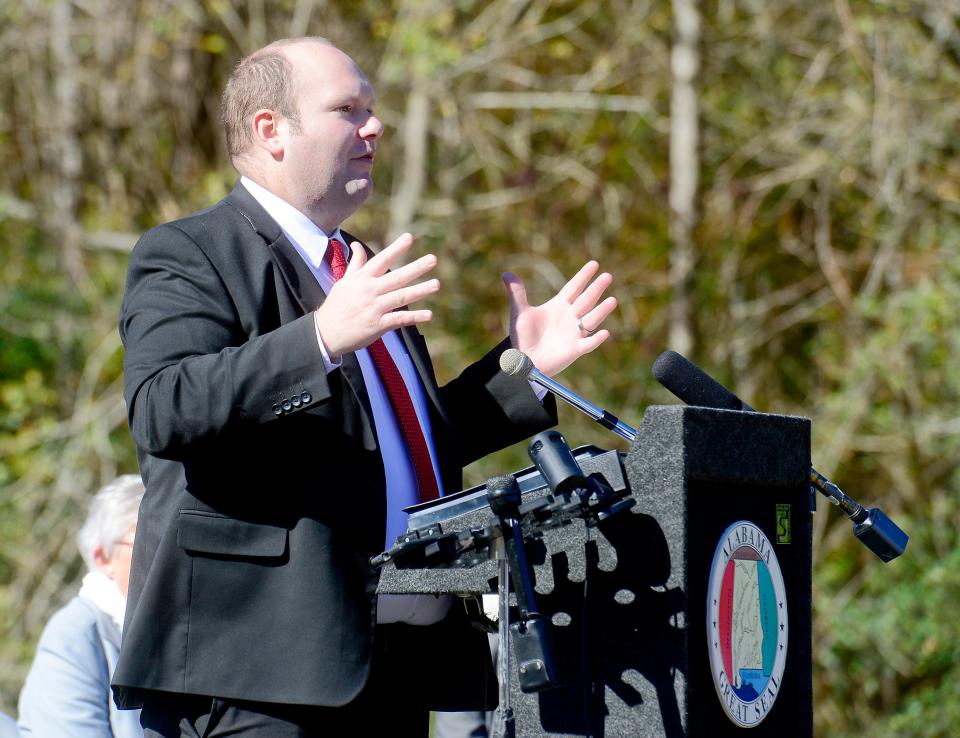Jones determined to eliminate or cut occupational taxes, says they hurt working people
Sen. Andrew Jones said he remains determined to eliminate or reduce occupational license fees in Alabama, even after absorbing brickbats at a town hall meeting on the issue Thursday night in Gadsden.
Five Etowah County cities — Gadsden, Attalla, Glencoe, Rainbow City and Southside — levy a 2% occupational tax on people who work there.
Mayors and officials of four of those cities were at the gathering at The Venue at Coosa Landing, detailing the draconian cuts in their budgets — and, in turn, in services — they insist will happen if the tax goes away, and lambasting Jones, R-Centre, for “messing in their business.”
Jones watched the livestream of the meeting, and said he was “disappointed at the way they were playing on people’s fears and sympathies.”
He added, “I would never do anything to hurt the citizens of Etowah County. I want to put more money back into their pockets.
“The sky is not falling,” Jones said, “but this tax hurts working people. I understand that the mayors and citizens have concerns, but I think this is a thoughtful proposal.”

Gadsden’s occupational tax takes in $15 million annually, 30% of the city’s general fund revenues. When Jones in an interview expressed plans to target occupational taxes for the second straight legislative session, Mayor Craig Ford directed the city’s department heads to come up with contingency plans for immediate 30% reductions in their budgets.
During Thursday’s town hall, they offered a litany of what those cuts would entail, starting with reductions in police and fire personnel and coverage, and stretching throughout all areas of city government and, by extension, people’s lives.
Jones insisted, “That’s the opposite of what my proposal would do.”
He said SB44, the bill he introduced last year that was “indefinitely postponed” in the Senate, called for a gradual reduction of one-tenth of a percent each year until a municipality’s occupational tax was phased out, not an immediate elimination of all revenue.
Jones said no bill has been drawn up for the 2023 session and that he’s still consulting “with legislative colleagues” on potential language. He said he’s open to reducing occupational tax rates, short of total elimination.
“I’d still like to work with the mayors to find a middle ground to where we could move forward,” he added, reiterating that he considers occupational taxes unfair and citing the high rates charged by the Etowah municipalities. Among the 25 cities that have occupational taxes, Tuskegee is the only other Alabama city that assesses 2%.
That didn’t happen at a meeting last week between Jones, Ford and the other mayors in question — Attalla’s Larry Means, Glencoe’s Chris Hare, Rainbow City’s Joe Taylor and Southside’s Dana Snyder — at Gadsden’s City Hall.
All but Hare attended Thursday’s town hall and insisted they are united and “dug in” on this issue. They accused Jones of overreaching by meddling in the functions of local government.
“The taxpayers of Etowah County are my business,” the senator said. “I was elected to stand in the gap for them. Furthermore, the Legislature has a responsibility to rein in municipal overreach. Just look at what we did most recently when we addressed police jurisdiction overreach or reined in excessive fines in places like Brookside.”
Responding to charges that he is “against Etowah County,” and a “Cherokee County senator,” he said, “The people of Etowah County are great.
“Addressing occupational taxes is not something I just dreamed up,” Jones continued. “I knocked on hundreds of doors during my first campaign (in 2018), hearing from a cross section of Etowah County. There was one clear takeaway: They were tired of business as usual in Etowah County, and part of that discussion often included concerns about occupational taxes.”
He said those concerns were particularly expressed by people who live in unincorporated areas of the county, not in any of its municipalities, who have no voice in how the cities they work in operate.
Jones said he and his wife have family in Etowah County and do business, shop, dine and often worship here. He said he’s “committed to seeing Etowah County achieve its full potential.”
Greg Bailey is editor of The Gadsden Times. He can be reached at 256-438-9921 or greg.bailey@gadsdentimes.com.
This article originally appeared on The Gadsden Times: Andrew Jones reinforces opposition to occupational taxes

